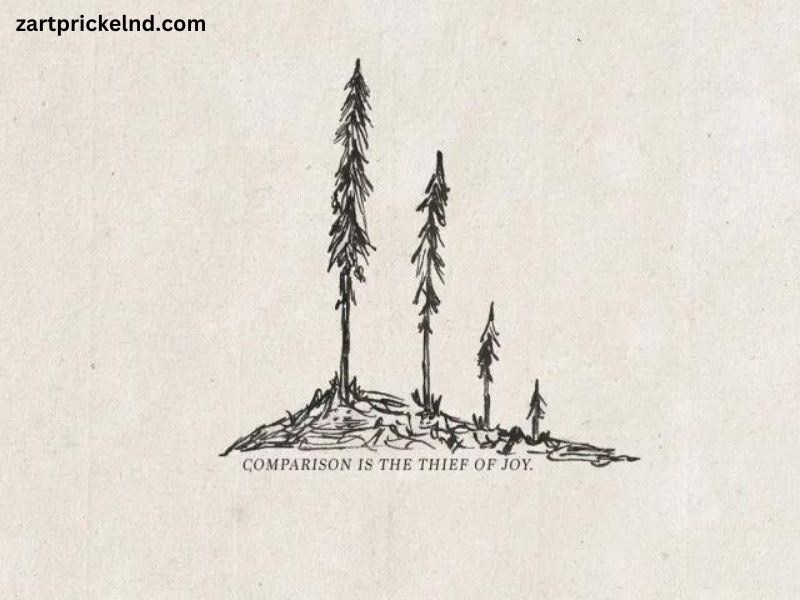In an age defined by social media and constant connectivity, the phenomenon of comparison has reached unprecedented levels. We find ourselves scrolling through curated lives, scrolling past images of friends’ successes, vacations, and seemingly perfect relationships. This relentless comparison can lead to a dangerous mindset where our own worth is measured against the achievements of others. The age-old adage, “Comparison is the thief of joy,” encapsulates this sentiment perfectly. But what does this mean, and how can we navigate a world that thrives on comparison?
The Origins of the Phrase
The phrase “comparison is the thief of joy” is often attributed to Theodore Roosevelt. It suggests that when we measure our own lives against others, we rob ourselves of the ability to appreciate our own accomplishments and happiness. This concept has roots in psychology and philosophy, dating back to thinkers like Socrates and Aristotle, who emphasized the importance of self-reflection and the dangers of external validation.
The Psychology Behind Comparison
The Social Comparison Theory
Psychologist Leon Festinger proposed the Social Comparison Theory in 1954, suggesting that individuals have an inherent drive to evaluate themselves, often against others. This comparison can be upward (comparing ourselves to those we perceive as better) or downward (comparing ourselves to those we see as worse). While downward comparisons might provide a temporary boost in self-esteem, upward comparisons can lead to feelings of inadequacy and dissatisfaction.
The Impact of Social Media
Today, social media serves as a breeding ground for comparison. Platforms like Instagram and Facebook showcase a highlight reel of people’s lives, filtered to perfection. Research has shown that increased time spent on social media correlates with feelings of depression and anxiety. The constant exposure to idealized versions of others can distort our self-image and make us feel like we’re falling short.
FOMO and the Pressure to Conform
Fear of Missing Out (FOMO) is another byproduct of our comparison-driven culture. We see friends attending events we weren’t invited to or traveling to exotic locations, leading us to question our own choices and experiences. This pressure can create a cycle of dissatisfaction, where we constantly chase after experiences that we believe will make us happier, only to find ourselves perpetually unfulfilled.
The Consequences of Comparison
Erosion of Self-Esteem
One of the most significant consequences of comparison is the erosion of self-esteem. When we continually measure ourselves against others, we may overlook our unique strengths and accomplishments. This can lead to feelings of inadequacy, self-doubt, and a diminished sense of self-worth. Over time, these feelings can contribute to mental health issues, including anxiety and depression.
Strained Relationships
Comparison doesn’t just affect our self-perception; it can also strain our relationships. When we compare our relationships to those of others, we may develop unrealistic expectations. This can lead to resentment, jealousy, or disappointment in our partners or friends, who may not live up to the idealized versions we see online or in the media.
Lack of Gratitude
Comparison can rob us of gratitude—the practice of recognizing and appreciating what we have. When we focus on what others have achieved, we become blind to our own successes and joys. This lack of gratitude can lead to a constant feeling of scarcity, where we believe that we never have enough—whether it’s time, success, love, or happiness.
Strategies to Combat Comparison
1. Cultivate Self-Awareness
The first step in combating the urge to compare is cultivating self-awareness. Recognize when you’re engaging in comparison and identify the triggers that prompt these thoughts. Journaling can be a helpful tool for this. Writing about your feelings and experiences can provide clarity and help you focus on your journey rather than others’.
2. Limit Social Media Exposure
Given the role of social media in promoting comparison, consider limiting your time on these platforms. Unfollow accounts that make you feel inadequate, and curate your feed to include content that inspires and uplifts you. Taking breaks from social media can also help you regain perspective and appreciate your own life.
3. Practice Gratitude
Incorporate gratitude practices into your daily routine. This could be as simple as keeping a gratitude journal where you write down three things you’re thankful for each day. By focusing on what you have rather than what you lack, you can shift your mindset from scarcity to abundance.
4. Set Personal Goals
Instead of comparing your achievements to others, focus on setting personal goals that align with your values and aspirations. This creates a roadmap for your own success, independent of external benchmarks. Celebrate your progress, no matter how small, and recognize that everyone’s journey is unique.
5. Foster Connections
Build genuine connections with those around you. Share your struggles and successes with trusted friends or family members. Engaging in meaningful conversations can help you realize that everyone has their own challenges, making it easier to appreciate your own journey.
6. Seek Professional Help
If feelings of inadequacy persist, consider seeking professional help. Therapists can provide valuable tools and strategies to help you cope with comparison and build a healthier self-image. Cognitive-behavioral therapy (CBT), in particular, can be effective in challenging negative thought patterns.
Embracing Individuality
Ultimately, it’s essential to embrace your individuality. Each person has a unique path, shaped by different experiences, challenges, and opportunities. Rather than measuring your worth against others, focus on your strengths, passions, and what brings you joy. This self-acceptance can foster a deeper sense of fulfillment and happiness.
Finding Joy in Others’ Success
While it may be challenging, try to find joy in the successes of others. Instead of viewing their achievements as a reflection of your shortcomings, recognize that their success does not diminish your worth. Celebrating others can create a positive environment and foster a sense of community, rather than competition.
Conclusion
In a world that thrives on comparison, it’s crucial to remember that your journey is your own. The adage “comparison is the thief of joy” serves as a reminder to prioritize self-acceptance, gratitude, and individual goals. By cultivating awareness and implementing strategies to combat the urge to compare, you can reclaim your joy and appreciate the unique life you lead. Ultimately, happiness comes from within, and by embracing your own story, you can find fulfillment in the present moment, rather than in the shadows of others.



